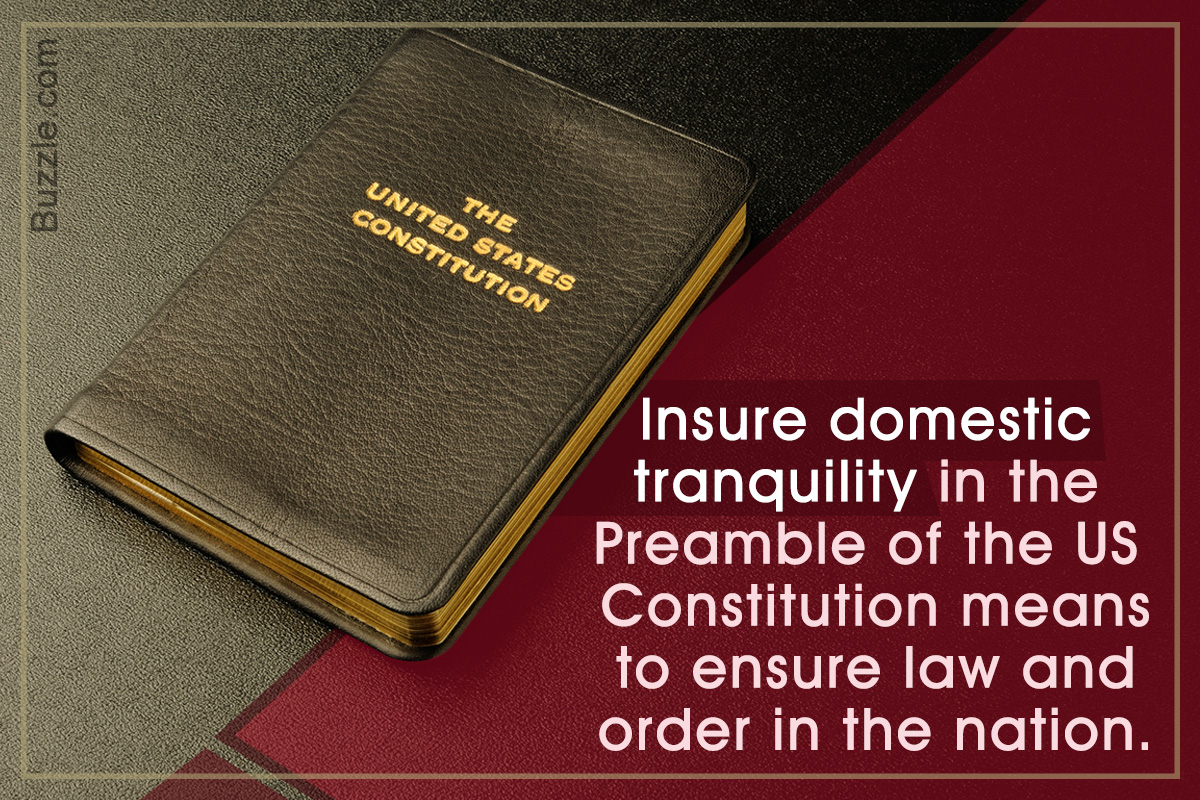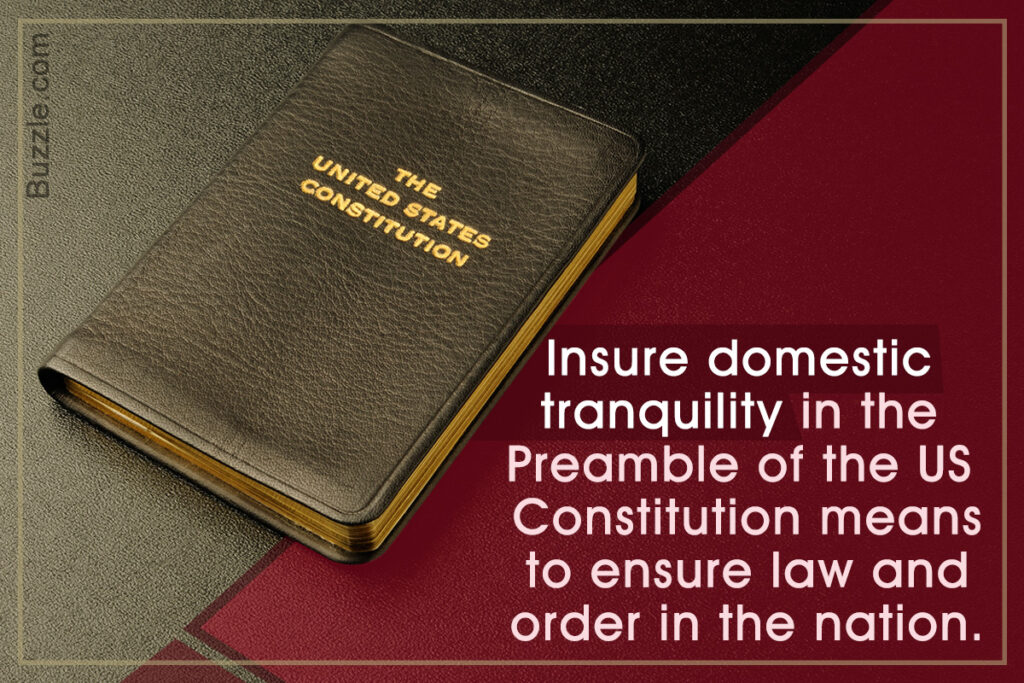Domestic Tranquility

In the context of the US Constitution, domestic tranquility refers to the state of peace, order, and security within the nation’s borders. It is one of the six purposes explicitly stated in the Preamble of the Constitution, alongside establishing justice, ensuring the common defense, promoting the general welfare, and securing the blessings of liberty.
Domestic tranquility has been interpreted and applied in various ways throughout US history. In the early years of the republic, it was primarily understood as the absence of internal strife or rebellion. However, as the nation expanded and faced new challenges, the concept of domestic tranquility evolved to include broader notions of social harmony, economic stability, and the protection of civil rights.
Relationship with National Security
Domestic tranquility is closely linked to national security. A peaceful and stable domestic environment is essential for the nation’s ability to defend itself against external threats. Internal unrest or division can weaken the nation’s defenses and make it more vulnerable to attack.
Threats to Domestic Tranquility
Domestic tranquility refers to a state of peace, order, and security within a nation. However, various threats can jeopardize this stability, both from within and outside the country.
Internal Threats
Internal threats arise from within the nation and can include:
- Political extremism and terrorism: Extreme ideologies and violent acts can disrupt social harmony and undermine public safety.
- Civil unrest and social disorder: Protests, riots, and other forms of social unrest can lead to violence and property damage.
- Economic inequality and poverty: Disparities in wealth and access to resources can create resentment and fuel social unrest.
External Threats
External threats originate from outside the nation and can include:
- Foreign aggression and invasion: Acts of war or military occupation can disrupt domestic tranquility and cause widespread devastation.
- Espionage and cyberattacks: Foreign entities may engage in intelligence gathering or cyberattacks that compromise national security and disrupt infrastructure.
- Foreign influence and propaganda: External actors may attempt to influence domestic politics or spread disinformation to undermine social cohesion.
These threats can have severe consequences, including loss of life, property damage, economic instability, and political instability. Maintaining domestic tranquility requires a concerted effort from law enforcement, government agencies, and the community at large.
Maintaining Domestic Tranquility
Maintaining domestic tranquility is a fundamental objective of any government, as it is essential for the well-being of its citizens and the stability of the nation. Various strategies and policies have been implemented to achieve this goal, including:
Law Enforcement and Criminal Justice
Effective law enforcement and a fair criminal justice system are crucial for deterring crime and maintaining order. This involves investing in law enforcement agencies, training, and resources, as well as implementing policies that promote swift and fair justice.
Economic Stability and Opportunity
Economic stability and opportunities play a vital role in reducing poverty, inequality, and social unrest. Governments can implement policies that promote job creation, education, and affordable housing to ensure that all citizens have the chance to improve their lives and contribute to society.
Social Programs and Community Engagement
Social programs and community engagement initiatives can help address underlying social issues that contribute to domestic unrest, such as poverty, unemployment, and lack of access to healthcare. These programs provide support and resources to vulnerable populations and foster a sense of community and belonging.
Intercultural Dialogue and Tolerance
Promoting intercultural dialogue and tolerance is essential for fostering understanding and respect among different groups within a society. Governments can support initiatives that encourage dialogue, cultural exchange, and education about diversity to reduce prejudice and discrimination.
Challenges and Opportunities in the 21st Century
Maintaining domestic tranquility in the 21st century presents unique challenges and opportunities. Rapid technological advancements, globalization, and social media have created new avenues for spreading misinformation, inciting unrest, and challenging traditional norms.
However, these same advancements also provide opportunities for governments and civil society organizations to engage with citizens, monitor potential threats, and promote positive dialogue. By leveraging technology and embracing innovation, governments can adapt their strategies to meet the evolving challenges of the 21st century.
Domestic Tranquility and Social Justice
Domestic tranquility is closely intertwined with social justice. When there is widespread social inequality and disparity, it can create tensions and conflicts within society, undermining domestic tranquility. Social justice, on the other hand, promotes fairness, equity, and equal opportunities for all, which contributes to a more stable and harmonious society.
Social Inequalities and Disparities
Social inequalities and disparities can manifest in various forms, such as income inequality, wealth gaps, educational disparities, and racial or ethnic discrimination. These disparities can lead to feelings of resentment, frustration, and injustice among those who feel marginalized or disadvantaged. This can erode trust in institutions and create a sense of alienation, which can contribute to social unrest and violence.
Social Policies and Programs
Social policies and programs play a crucial role in promoting both domestic tranquility and social justice. These policies and programs can address social inequalities and disparities by providing support and opportunities to disadvantaged groups. Examples include social welfare programs, affordable housing initiatives, educational equity initiatives, and anti-discrimination laws. By promoting social justice, these policies and programs contribute to a more cohesive and stable society.
Domestic Tranquility and International Relations
Domestic tranquility can be significantly impacted by international events and relationships. Political instability, economic crises, and conflicts in other countries can have ripple effects that create unrest and disruption within a nation’s borders. For example, economic downturns in major trading partners can lead to job losses and financial hardship, contributing to social unrest and political polarization.
Role of Diplomacy and Foreign Policy
Diplomacy and foreign policy play a crucial role in maintaining domestic tranquility by promoting cooperation, resolving conflicts, and mitigating potential threats. Diplomatic efforts can help prevent or de-escalate international crises that could spill over into domestic affairs. By engaging in dialogue, negotiation, and mediation, diplomats can work towards peaceful resolutions that safeguard national interests and promote stability.
Impact of Globalization
Globalization, while offering economic benefits, can also pose challenges to domestic tranquility. Increased interconnectedness and interdependence can make countries more vulnerable to external influences and shocks. Economic globalization, for instance, can lead to job displacement and wage disparities, potentially contributing to social tensions and political divisions. Similarly, cultural globalization can bring new ideas and perspectives, but it can also lead to cultural clashes and conflicts over values and identities.





